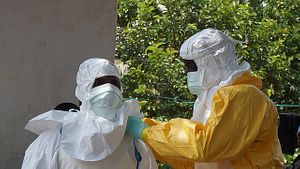U.S. President Barack Obama recently ordered the U.S. military to intervene in the fight against the Ebola virus. Responding to the mounting death toll and requests for assistance from West Africa, the U.S. military will soon provide a logistic “air bridge” into Ghana, a command center in Liberia, 17 new hospitals, a high-throughput training facility, and up to 3000 troops. This is a remarkable surge in resources and American commitment, yet it also raises the critical question: How can the U.S. military be most effective in this new mission?
Perhaps the U.S. military can help turn the tide on what has heretofore been a largely unmitigated disaster. But military involvement also carries considerable risks, as indicated by research into health diplomacy by the U.S. Navy in Indonesia, let alone the military’s struggle to defend itself when diseases are used as biological weapons. Among other concerns, at least three political risks should be anticipated and mitigated to help win the fight against Ebola.
First and foremost, resources are limited. U.S. assistance may prove insufficient and so conflict may arise over scarce resources. While healthcare is sometimes misrepresented as an apolitical or global public good, it is not. There can be winners and losers, as tragically illustrated by images of people near death lying outside the closed doors of overflowing hospitals in Monrovia.
The military should plan accordingly. Triage procedures at the hospitals it builds or staffs should be transparent, for example, and troops should have public relations and legal support on hand to address potential conflicts early on. The lack of such support hurt the U.S. Naval Medical Research Unit (NAMRU-2) when its presence in Indonesia started to become controversial in the late 1990s. Moreover, as in Indonesia, conspiracy theories about the U.S. military and Ebola already run rampant. It would therefore be wise to prepare for resistance and controversy so that conflict can be managed, thereby increasing the potential for more local and international cooperation.
Second, U.S. military intervention against Ebola is rather unprecedented. Granted, NAMRU-2 built a microbiology lab for Indonesia in Aceh after the 2004 Sumatra tsunami. And the U.S. military has delivered humanitarian assistance after Typhoon Haiyan and other natural disasters, as well as provided healthcare as part of nation-building in Afghanistan and Iraq. But a contagion like Ebola is not the same as a typhoon or tsunami. Unfortunately, in the past, the U.S. military has struggled to understand and even recognize important differences in nonkinetic missions – particularly those involving infectious disease. As a result, the top brass should heed to advice from medical and biodefense experts throughout this intervention.
Third, deservedly or not, the U.S. military is also at risk of becoming a convenient scapegoat if the international effort against Ebola continues to fall short. After all, civilians in the public health community are often suspicious of the armed forces.
To increase the chances of success and avoid being an easy target for blame, the U.S. military should work to build trust across a broad coalition. It should foster interpersonal relationships, not only with its military counterparts in the region, but also with the civilians involved with diplomacy, transportation, communications, and especially public health. For instance, Médecins Sans Frontières (MSF) deserves tremendous credit for fighting this outbreak so long and calling for military assistance. The U.S. military should reach out to MSF in return, as well as other non-governmental organizations and ministries of health across West Africa.
U.S. military intervention against Ebola may prove decisive in the months ahead. Or it may backfire if the risks of conflict, misunderstanding and mistrust are not mitigated in advance. The stakes are far too high not to take proactive steps that will improve the odds of civil-military cooperation actually ending this deadly outbreak.
Frank L. Smith III is a Lecturer with the Centre for International Security Studies and the Department of Government and International Relations at the University of Sydney. His teaching and research examine the relationship between technology and international security.

































